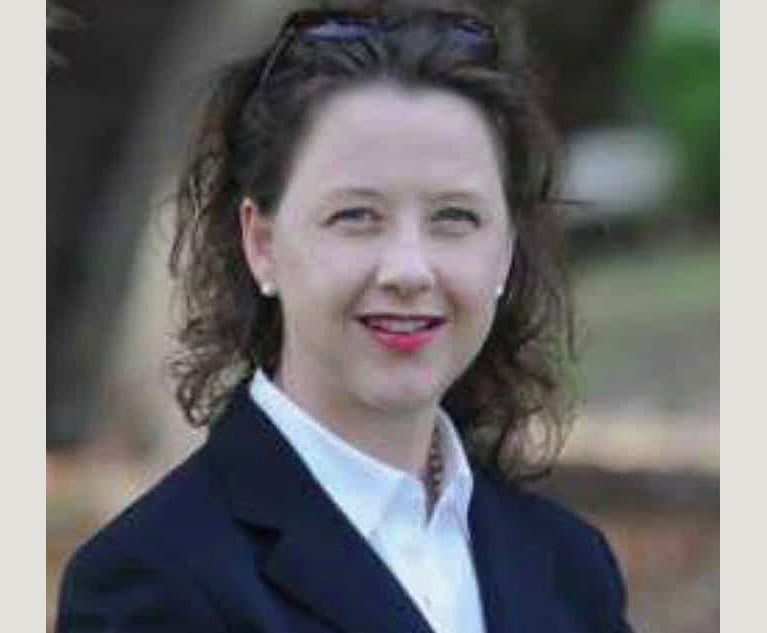Supreme Court Justices Disagree—on These Three Writing Tools
A legal writing professor's examination of U.S. Supreme Court decisions shows the justices usually achieve unanimity on most matters of style. But on three points—conjunctions, possessives and fragments—the justices divide.
March 14, 2018 at 07:24 PM
4 minute read
 Justice Elena Kagan (2015). Credit: Diego M. Radzinschi / ALM
Justice Elena Kagan (2015). Credit: Diego M. Radzinschi / ALM Justice Elena Kagan adds an apostrophe and “s” to the possessive of Congress. Justice Clarence Thomas only adds an apostrophe. Chief Justice John Roberts Jr. uses sentence fragments for effect—”Tough as a three-dollar steak.” You won't find fragments in the opinions of Justice Anthony Kennedy in recent terms.
Despite some individual differences, the Roberts court displays a more liberal, modern and conversational bent in writing style in general, Jill Barton, a legal writing professor at the University of Miami School of Law, says in her study “Supreme Court Splits…on Grammar and Writing Style.”
“Language and writing are evolving,” Barton told The National Law Journal. “Some of the choices the justices are making reflect a desire to write in a way that isn't dull or overly formal. And they want their prose to be lively and interesting. Many of the justices—especially Roberts and Kagan—take great care in turning a phrase and how to explain complicated concepts. It doesn't all have to be that boring.”
Barton examined every signed opinion, concurrence and dissent from the 2014 and 2015 terms (which included the late Justice Antonin Scalia's opinions). She concluded that the justices usually achieve unanimity on most matters of writing. But on three points of style in particular—the use of conjunctions, possessives and fragments—the justices divide in following traditional or more modern rules.
“If sentence fragments were bad legal writing, we wouldn't have 'Pure applesauce,'” Barton wrote. That colorful and memorable phrase, of course, was Scalia's criticism of the majority opinion in the health care challenge, King v. Burwell.
The justices split 5-4 on whether sentence fragments are useful in their writing.
Justices Kennedy, Clarence Thomas, Stephen Breyer and Samuel Alito Jr. are in the conservative camp—none of them used a fragment in any of their opinions during the two terms. The remaining five did use them, but rarely, according to the study.
Kagan uses fragments more often than her four colleagues. For example: in Kimble v. Marvel Entertainment, she wrote, “Maybe. Or, then again, maybe not.” The other four have dropped fragments into their opinions, such as: “So too here,” “Surely not” and “Quite the contrary.”
The high court also splits 5-4 on whether a singular word ending in “s” should get only an apostrophe or an apostrophe plus an “s” to show the possessive, the study found. That division, said Barton, is clearest on the word “Congress.”
Roberts, Scalia, Alito and Kagan add an extra “s” to Congress—Congress's. But the majority—Kennedy, Thomas, Ginsburg, Breyer and Sotomayor—just add the lone apostrophe.
To make matters a little more complicated—or refined—the minority justices add an apostrophe plus “s” to the end of the singular form of a noun but leave off the extra “s” when the noun is in its plural form. So it is Congress's and plants' in the possessive.
Barton also reports the justices divide 6-3 in favor of using “since” when they mean “because,” and 8-1 in favor of starting sentences with “So.”
Barton, also the author of “So Ordered: The Writer's Guide for Aspiring Judges, Judicial Clerks, and Interns,” updated her study with a look at the style of freshman Justice Neil Gorsuch on the style points that she examined in the writings of the other justices. “He tracks Justice Scalia. None of my numbers changed,” Barton said.
Gorsuch, she added, might be taking things a step further. “He uses contractions. In his opening paragraph in his first majority opinion, he used a contraction and later a dozen times more,” she said.
Scalia called contractions “intellectually abominable” but used them only in his dissents—a restraint followed by some of his colleagues, said Barton, adding Gorsuch has shown no such restraint.
“All these style choices reflect a willingness to leave old-fashioned conventions behind and adapt to a more evolving view of language,” she concluded.
Read more:
Latest Rap on Gorsuch: He's a Rotten Writer
Law Schools Must Do More to Boost Student Writing Skills, Kagan Says
Why Top Advocates Are Ghostwriting SCOTUS Briefs
Kagan Says Repeat Players at SCOTUS 'Know What It Is We Like'
This content has been archived. It is available through our partners, LexisNexis® and Bloomberg Law.
To view this content, please continue to their sites.
Not a Lexis Subscriber?
Subscribe Now
Not a Bloomberg Law Subscriber?
Subscribe Now
NOT FOR REPRINT
© 2025 ALM Global, LLC, All Rights Reserved. Request academic re-use from www.copyright.com. All other uses, submit a request to [email protected]. For more information visit Asset & Logo Licensing.
You Might Like
View All
Hogan Lovells, Jenner & Block Challenge Trump EOs Impacting Gender-Affirming Care
3 minute read
GOP-Led SEC Tightens Control Over Enforcement Investigations, Lawyers Say

SEC Sued for Failing to Reveal Records Involving Simpson Thacher Attorney
4 minute read
Ex-Prosecutor’s Trial Ends as Judge Throws Out Her Felony Indictment in Ahmaud Arbery Death Case
Trending Stories
- 1Judge Extends Tom Girardi's Time in Prison Medical Facility to Feb. 20
- 2Supreme Court Denies Trump's Request to Pause Pending Environmental Cases
- 3‘Blitzkrieg of Lawlessness’: Environmental Lawyers Decry EPA Spending Freeze
- 4Litera Acquires Workflow Management Provider Peppermint Technology
- 5'I Can't Do This': Judge Blocks $16M Alex Jones Settlement
Who Got The Work
J. Brugh Lower of Gibbons has entered an appearance for industrial equipment supplier Devco Corporation in a pending trademark infringement lawsuit. The suit, accusing the defendant of selling knock-off Graco products, was filed Dec. 18 in New Jersey District Court by Rivkin Radler on behalf of Graco Inc. and Graco Minnesota. The case, assigned to U.S. District Judge Zahid N. Quraishi, is 3:24-cv-11294, Graco Inc. et al v. Devco Corporation.
Who Got The Work
Rebecca Maller-Stein and Kent A. Yalowitz of Arnold & Porter Kaye Scholer have entered their appearances for Hanaco Venture Capital and its executives, Lior Prosor and David Frankel, in a pending securities lawsuit. The action, filed on Dec. 24 in New York Southern District Court by Zell, Aron & Co. on behalf of Goldeneye Advisors, accuses the defendants of negligently and fraudulently managing the plaintiff's $1 million investment. The case, assigned to U.S. District Judge Vernon S. Broderick, is 1:24-cv-09918, Goldeneye Advisors, LLC v. Hanaco Venture Capital, Ltd. et al.
Who Got The Work
Attorneys from A&O Shearman has stepped in as defense counsel for Toronto-Dominion Bank and other defendants in a pending securities class action. The suit, filed Dec. 11 in New York Southern District Court by Bleichmar Fonti & Auld, accuses the defendants of concealing the bank's 'pervasive' deficiencies in regards to its compliance with the Bank Secrecy Act and the quality of its anti-money laundering controls. The case, assigned to U.S. District Judge Arun Subramanian, is 1:24-cv-09445, Gonzalez v. The Toronto-Dominion Bank et al.
Who Got The Work
Crown Castle International, a Pennsylvania company providing shared communications infrastructure, has turned to Luke D. Wolf of Gordon Rees Scully Mansukhani to fend off a pending breach-of-contract lawsuit. The court action, filed Nov. 25 in Michigan Eastern District Court by Hooper Hathaway PC on behalf of The Town Residences LLC, accuses Crown Castle of failing to transfer approximately $30,000 in utility payments from T-Mobile in breach of a roof-top lease and assignment agreement. The case, assigned to U.S. District Judge Susan K. Declercq, is 2:24-cv-13131, The Town Residences LLC v. T-Mobile US, Inc. et al.
Who Got The Work
Wilfred P. Coronato and Daniel M. Schwartz of McCarter & English have stepped in as defense counsel to Electrolux Home Products Inc. in a pending product liability lawsuit. The court action, filed Nov. 26 in New York Eastern District Court by Poulos Lopiccolo PC and Nagel Rice LLP on behalf of David Stern, alleges that the defendant's refrigerators’ drawers and shelving repeatedly break and fall apart within months after purchase. The case, assigned to U.S. District Judge Joan M. Azrack, is 2:24-cv-08204, Stern v. Electrolux Home Products, Inc.
Featured Firms
Law Offices of Gary Martin Hays & Associates, P.C.
(470) 294-1674
Law Offices of Mark E. Salomone
(857) 444-6468
Smith & Hassler
(713) 739-1250








